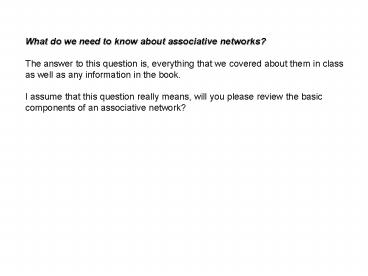What do we need to know about associative networks
1 / 14
Title:
What do we need to know about associative networks
Description:
... Histrionic PD (high) Obsessive-Compulsive PD ... Avoidant PD, most others (high) Antisocial, Narcissistic PD (low) ... always try to gear myself up for the ... –
Number of Views:31
Avg rating:3.0/5.0
Title: What do we need to know about associative networks
1
What do we need to know about associative
networks? The answer to this question is,
everything that we covered about them in class as
well as any information in the book. I assume
that this question really means, will you please
review the basic components of an associative
network?
2
Associative networks
I/me
Danger
Fear
Bitten
Teeth
Fur
Vet bills
Pet
Love
3
Could you explain again the MMPI graph analyzing
Dahmer and Manson? Could you briefly explain
the L,F,K scales on the MMPI again?
4
The Minnesota Multiphasic Personality Inventory
5
With regards to OCEAN and PDs...can you elaborate
on the criticism of the DSM?
6
Personality disorders Questions and assumptions
6. Personality disorders represent extremes of
normal personality Personality disorder is
based on an arbitrary cut point in a continuous
distribution of normal personality (Widiger,
UK). O Schizotypal, Histrionic PD
(high) Obsessive-Compulsive PD (low) C
Obsessive-Compulsive PD (high) Antisocial
PD (low) E Histrionic, Narcissistic PD
(high) Schizoid, Schizotypal, Avoidant
(low) A Dependent PD (high) Antisocial,
Narcissistic, Paranoid PD (low) N
Borderline, Avoidant PD, most others
(high) Antisocial, Narcissistic PD (low)
7
Could you explain ego-syntonic again,
specifically how someone can/cannot experience
something as alien? Example of alien or non-alien
with a PD?
8
Personality disorders Questions and
assumptions 4. Personality disorders are
ego-syntonic (i.e., not experienced as
alien) 5. Personality disorders are distinguished
by interpersonal disruption They are often
seeking evaluation at someone elses request.
Their presenting complaints often involve the
behavior of other people, rather than their own
experiences. Cluster A distrust and
suspiciousness of others (Paranoid PD),
detachment from social relationships (Schizoid
PD), discomfort with and reduced capacity for
close relationships (Schizotypal PD) Cluster B
disregard for and violation of the rights of
others (Antisocial PD), instability of
interpersonal relationships (Borderline PD),
interaction with others characterized by
inappropriately seductive or provocative behavior
(Histrionic PD), is interpersonally exploitative
(Narcissistic PD) Cluster C social inhibition,
unwilling to get involved with others (Avoidant
PD), submissive clinging and fears of separation
(Dependent PD), preoccupation with interpersonal
control (Obsessive-Compulsive PD)
9
Could you explain how and why on some examples of
attributional reformulation? How do attributional
styles affect other domains of life?
10
Something bad and uncontrollable has happened to
me. Why? Attributional reformulation of learned
helplessness (1978)
Internal dimension of attributions Could this
have happened to anyone, or is this something
about me? Im a bad person vs. Hes a bad
person Stable dimension of attributions Is
this cause going to be present in the future, or
was this a one-time thing? Im a clumsy person
vs. I left a rake on the lawn Global dimension
of attributions Is this cause going to affect
more than one area of my life? Im a bad
student vs. Im bad at French Internal
stable global for negative events
attributional or explanatory pessimism
11
Something bad and uncontrollable has happened to
me. Why? Attributional reformulation of learned
helplessness (1978)
When I get really down on myself, I basically
have a breakdown . . . Im a very negative
person. My friends will ask me about it, but I
know they really dont want to hear about it . .
. because theyre not involved with it. The
whole Socratic teaching method has been a bit of
a challenge . . . because you are expected to be
prepared every day. Worrying about the test was
worse than taking the test . . . because I always
try to gear myself up for the worst. It was
probably worse last semester than itll ever be .
. . because I had never taken a law school test
so I didnt know what it was like.
12
Could you briefly explain the two slides on the
negative feedback loops? The components of them
such as a 'comparator' etc.
13
Dispositional optimism Generalized positive
outcome expectancies Negative feedback loop
(makes discrepancies smaller)
Optimistic expectancies
pursuing goals investing time and energy
coping with stress
14
are we getting any extra credit Quite possibly,
if you submitted a lot of the online data almost
definitely, if you submitted all of it. I know
we need to read chapters 9 11 but could you
specify the page numbers for the other
sections/topics we're supposed to cover in the
book to be sure? Chapters 9, 11, and 12 will be
covered on the exam. Check your syllabus. Is
there anything we need to know about the clusters
A,B,C other then which personality disorders are
in each and the characteristics of each? I think
thats all that we covered about the personality
disorder clusters in class. If so, then no.































